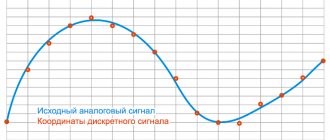What is needed to switch to digital TV in Krasnodar
To view digital television, you must have a television purchased in 2013 or later. These TVs can work with the DVB-T2 standard, which guarantees the reception and decryption of a digital signal on the territory of the Russian Federation. In this case, to switch to digital broadcasting in Krasnodar, it is enough to configure it through its menu.
If you have a television receiver manufactured before 2013 or an older brand, you need to purchase a decoder set-top box for it. Its cost starts at six hundred rubles. The receiver must function with the MPEG4 standard.
For the receiver to function, you will need an external or indoor antenna. The TV tuner can be connected to a common antenna. If you don't have such an antenna, you will need to contact your utility company.
In most houses in the capital, the signal is sent through a district repeater. After decoding by the tuner, it is transmitted via cable to subscribers. In such a situation, subscribers will not need to install additional set-top boxes.
homyak:
09/12/2015 at 23:42
Natalya Tovancheva: “I haven’t been afraid of anything for a long time”
09:00 | 09.09.2015
The director of the Kuban State Television and Radio Broadcasting Company told Yugopolis about what she lacks in Krasnodar, what regional television will be like and in what cases it is better to throw away food.
— Natalya, recently there was a kind of housewarming at the Kuban State Television and Radio Broadcasting Company - after two years of renovation, you opened a new studio and completely refurbished the company. Does this mean digital television is being launched in the region?
— It hasn’t launched yet, but we are already ready for it. We have passed the first and very important stage - the technical re-equipment of the company. It was a very difficult process. This is not just a repair like “change the wallpaper”, but a change of complex communications, installation of the most modern equipment. We tore down walls and changed floors. Then 4 huge trucks of equipment arrived from Moscow to Krasnodar, and the same number to Sochi. And we started installing this equipment and learning how to operate it.
The most difficult thing was that the work on air did not stop for a second. A difficult 2+ years... I still have a picture before my eyes of presenter Sergei Kozhanov standing in the studio, and at this time the workers begin to hum with a hammer drill. And his cry echoes throughout the studio: “20 minutes of broadcast. Everyone keep quiet! We made a film about this.
— How do you see the future of regional television?
— It is assumed that multiplex 3 will have one regional channel, the frequency and content of which will belong to the State Television and Radio Broadcasting Company of each region.
— What will happen to the rest of the companies operating in the region?
— They will cooperate with State Television and Radio Broadcasting Company as a production studio.
— That is, for example, “Kuban-24” could in the future become a production studio for the State Television and Radio Broadcasting Company “Kuban”, when the era of digital TV begins?
— Yes, I think that this will happen in the future.
— But “Kuban-24” also broadcasts on satellite.
— When a regional channel emerges, no one will allow anyone to pay from the budget for an expensive satellite story for a regional channel if digital TV is available.
Two large regional TV for the budget. Sooner or later it will end"
— Will small television companies also be able to become production studios?
- Of course, it is necessary that it would be interesting for everyone - to create one regional channel. By the way, interesting opportunities will open up for everyone. And the fact that there will be savings in budgets at all levels is an indisputable plus during a crisis. By the way, in Russia there are already precedents for such agreements between State Television and Radio Broadcasting Company and regional television. Two large regional TV for the budget. Sooner or later it will end. Yes, both creatively and socially it is convenient. Nobody will lose their job. There will remain projects that the audience knows and loves.
- There is also a question of ambition. After all, we have many television companies in Kuban. And each has a director, chief producer, etc.
— I am a negotiator in life. And I know that any problem can be solved through negotiations. I think the creation of such a common regional channel will be very interesting work. All interested people will gather into one team, and it will be possible to create an incredibly interesting channel. After all, local content is always more interesting than federal content. This will allow us not to scatter resources, as, by the way, is being done now.
— How do you imagine it: what will it be filled with?
— More than half of the airtime will probably be occupied by local news - economics, culture, sports, incidents.
— Films: feature films, documentaries?
— Feature films on regional television are some kind of luxurious fun. Documentary - yes. But, unfortunately, we have a very weak documentary base in Kuban. Strong documentarians can be counted on the fingers of one hand.
- ... and somehow we part with those very easily. Valery Timoschenko went to Stavropol to work.
- This is actually my pain, and that of other leaders - why bright personalities leave our region.
— Do you see talk programs, talk shows, political programs in the lineup of the updated channel?
— The success of these programs often depends on newsmakers, those who will speak and create news feeds. Such programs existed perfectly on regional TV channels in Yekaterinburg, Krasnoyarsk, Tomsk. There were people there who were not afraid to speak openly and honestly. We don't have enough such bright personalities. We can't find them even for the simplest commentary in the story. We don't have the environment for this.
- But times are difficult. And people need to talk through difficult problems out loud. Look, the federal channels are full of talk shows... I think Kuban residents also have a need to discuss problems. It is now being implemented on the same social networks. Why can’t we make a platform on TV for talking about sensitive and painful topics in the region?
- That's a good question. But television is mainly watched by an older audience. Young people are all on the Internet. The age audience in Kuban is quite conservative. Not all topics are interesting to her. In addition, talk shows are financially very expensive. This is a clash of opinions. I want to ask you who to confront whom in the studio? So that it would be interesting to everyone? Make a program like Andrei Malakhov's? This is a lot of money. The region will not tolerate this. There is only one Malakhov in the whole country. I don't like competing in different weight categories.
— Recently, many people have begun to call the TV a zombie box. Aren't you offended to hear this? And some people have stopped watching TV altogether because they don't like what they see.
- This is very funny to me. You won't reject the library just because you don't like some book that's on the shelf there, will you? I also don’t watch much TV outside of work - I simply don’t have time for it. But in general it is the same wealth as, for example, a library. On the Internet, you can also go to a porn site and say that you don’t like the entire Internet. Or like it. It's a matter of your choice. And television is a very diverse story.
— Do you receive any recommendations from the regional authorities? Do you have any contacts, “high-level meetings”?
- There is contact. There were meetings. They are of a working nature.
— Will you go to the gubernatorial elections?
— I always go to the polls.
- Why?
- How why? What a question? Because I really care who will be the governor of our region, who will be a deputy of the City Duma.
— You once put a lot of effort, emotion and labor into your body). Do you regret leaving this company? Still, there are more opportunities for creativity there.
- No, it was a completely conscious choice. Nothing to regret. And there are no less opportunities for creativity at the State Television and Radio Broadcasting Company.
— There are many versions of your appointment to the State Television and Radio Broadcasting Company. Which one is correct?
- This is an incredible story. I worked at NTK as a deputy director. But with very great powers, because the director at the same time also headed one Sochi television company. It was very interesting to me. Back then there were a lot of talented guys in the company, creativity was in full swing, and the degree of optimism was off the charts.
At the beginning of September 2002, I was going to go to Anapa for the Kinoshock festival. The bell rings. “Hello, Natalya Grigorievna. Dobrodeev's receptionist is speaking to you. I’m connecting with Oleg Borisovich.” Of course, I theoretically knew who Oleg Borisovich Dobrodeev was. But for me he existed somewhere far away - like a god. A pleasant male voice on the phone said: “Hello, could you come to me tomorrow?” - he asked, as if he were on the next street. Indeed, why not? I thought: we’re so cool, Dobrodeev must have found out about us and wants to start some kind of project with our television company.
The next day I was at VGTRK. Oleg Dobrodeev entered the meeting room and with him a smiling man of dazzling beauty. It turned out to be Anton Zlatopolsky, general director of the Russia-1 channel. The conversation was short. Dobrodeev: “Natasha, we have an offer for you - to head the Kuban State Television and Radio Broadcasting Company.” Well, it’s good that my nerves are strong and I know how to control my face. I say: “But there is a director there - Vladimir Runov.” Dobrodeev said that this shouldn’t worry me, they take care of all the formalities. We talked for a while and I agreed. After that, I flew straight to Kinoshock.
Information about the appointment has already leaked, although no official decision has yet been made. It was very funny when the employees of the State Television and Radio Broadcasting Company "Kuban" at "Kinoshok" walked around me on cue. Even in the village of Gostagaevskaya, where actors are taken out to drink moonshine and go all out. And everyone is having fun until they drop - artists, journalists. But not the employees of the Kuban State Television and Radio Broadcasting Company. This was probably the only year when they didn’t drink at all in Gostagaevskaya...
No one in the company really knew me. There was a rumor about me that I was a terrible bitch. The initiative group of the State Television and Radio Broadcasting Company team went to Rostov-on-Don to the plenipotentiary representative of the President of Russia to defend the candidacy of Vladimir Runov. In general, the team was worried. I was appointed on September 17th. It will soon be 13 years that I have been working in this position. To anticipate your question: the guys from the initiative group are also working.
— At first you had a rather strict personnel policy.
- Yes. This was one of the points of our conversation with Oleg Borisovich. I received my credentials.
- Has she justified herself?
- Absolutely. We now have an amazingly talented team of whom I am proud.
— Why do so many rush to Moscow?
— State Television and Radio Broadcasting Company has always been a source of personnel for federal channels. There are many talented people. But not everyone wants to work here. And I understand them very well.
- Not interested? Low wages?
— Not even small salaries are in the foreground, although they are really small. Few people in Moscow reach another level financially. Because here you receive a salary, let’s say, 30 thousand rubles, but you live in your own apartment. Then you go to Moscow, earn 70 and are terribly happy. But of these 70, a third is spent on renting an apartment, another part on getting to the center and eating, in the end you dress in the same chain stores as here. And you can afford to spend your vacation the same way you spent it while living in Krasnodar. So finance is not what young professionals go to Moscow for.
— What is missing in Krasnodar?
- I don't have enough air. Interesting conversation. I miss people whose level I would reach out to. It is always important in journalism to have some masters standing above you who would make a creative product better than you. But here there is no such layer. Many professional journalists have spread to senior positions, press services, and neighboring areas. Because it’s humiliating to work as a journalist and get paid three kopecks. And the salaries of journalists today in the local market, I repeat, are low. You see that a Moscow journalist of the same level earns several times more. And it's a shame.
And since the masters left journalism, the youngsters have no one to follow. There's nowhere to grow.
Margarita Simonyan, Andrey Blagodyrenko, Ekaterina Yakovleva, Eduard Gorborukov, Nikolai Zakharov, Natalya Litovka - dozens of our guys became prominent journalists in Moscow and made careers. I don’t know what their fate would have been like if they had stayed here in Kuban.
— You recently published a post about Krasnodar, which blew up the Internet. You wrote that the best and brightest are fleeing this city as if from a leper colony.
- Yes. This is true.
We are the same people as the Germans - two arms, two legs, a head. But why is everything so sad and shabby here? Is it really up to Putin to do everything for us - to restore order in the courtyard? Why do we live such a boring, dull and ugly life? And it’s not about money at all, it’s not about the crisis.”
- That there is not enough air, communication, a breeding ground for talents here. No drive. No atmosphere.
- This is true. It's my opinion.
“Then I want to ask: what are you doing here anyway, if everything is so bad?” Why do you live here? What's holding you back?
- And I leave - and quite often. I found an outlet for myself - travel.
— So, Krasnodar is a city only for work? Is there something holding it here?
- Holds a lot. Family. I have old parents. My beloved son lives here, he is a terrible patriot, he really likes it here, and he is not going to leave anywhere. I have certain obligations to the team. This is my favorite job. I just came up with such an outlet for myself - I love to travel. And this saves me. I don’t live in harmony with the city, alas. I don't even like to walk here.
—Where do you like to walk?
- In Vienna. This city is like home to me. I adore its spirit, music and architecture. But I am well aware that this is a different life, culture, mentality. And then: when you come to a city as a tourist, it’s one story, but living is a completely different story. Therefore, I have never considered the issue of moving in my life. I'm fine in my country. And then – my work is related to language. I can hardly imagine my life without work. This is self-realization for me. That's why there are cities where I come and walk. People go to the park. And I'm flying to Vienna. Or to Moscow. I love Moscow theaters. I have many friends in Moscow. More than in Krasnodar.
Why do people disrespect their city and their compatriots so much that they can walk in shorts, without a T-shirt, along the main street? Moreover, it is clear that these are locals. Panties, socks, sandals - and scratched... It's terrible"
— When I read on Facebook that in the evening instead of dinner you are studying for an English test, I feel ashamed. The piece won’t go down your throat... Why are you studying English?
- For traveling. I like to travel alone, without any travel agencies. Language is very necessary in such a situation. This year, my grandson and I traveled through Austria and Germany.
— Is a trip to Crimea on your agenda?
“I’ll go there a little later, when the bridge is built.”
— What do travel give you?
- It's a joy to know. On our last trip, my grandson and I lived in Germany, in a remote village, there wasn’t even a store there. We went for a walk around this village, and I had the feeling that all the houses were participating in a competition for the most beautiful courtyard in the world: everything was so well-groomed. At the same time, all the gates were open. The grandson even asked: “Aren’t they afraid of thieves?” All the people we met smiled and said hello.
And after that I came home and went to the wonderful city of Yeisk. I’m driving, and everything inside is turning over. Because I see shabby courtyards with heaps of rubbish, rickety sheds. Two-meter blind fences. Dirty, gloomy, sad, joyless. If it were up to me, I would walk around our yards: “Guys, let’s throw out this trash together, I’ll help you.” We are the same people as the Germans - two arms, two legs, a head. But why is everything so sad and shabby here? Is it really up to Putin to do everything for us - to restore order in the courtyard? Why do we live such a boring, dull and ugly life? And it’s not about money at all, it’s not about the crisis.
To throw away garbage that has been lying in the shed for 20 years, all you need is desire. You stand on Saturday, sipping a beer, blaspheming the authorities, and your peer in Europe at this time is painting a fence and planting flowers - that’s the whole difference.
— If you wanted to change our city, what would you change?
- People's attitude towards their work. Here I am driving along the Northern Bridges during their renovation. No one is against it, the roads need to be repaired. But! I see several dozen maintenance workers in the middle of the workday. In reality, about five of them worked. The other forty-five along the entire route sat, stood, thought, and chatted. Is this normal? It infuriates me, this attitude towards work and towards your city. And this does not depend on either the mayor or the president. Because in Europe, if road repairs are underway, then everyone really works. Of course, we also look very provincial. Why do people disrespect their city and their compatriots so much that they can walk in shorts, without a T-shirt, along the main street? Moreover, it is clear that these are locals. Panties, socks, sandals - and scratched... It's terrible.
— You’re such a patriot, but you write with gusto on social networks about Italian ice cream. What will you do when we finally substitute imports? Wouldn't you rather eat Glavproduct brand ice cream?
- I won't eat it.
- From what? It's tasty. Don't take it as an advertisement.
— I don’t like the ice cream that I tried here. The only ice cream I eat in Krasnodar is Latvian.
- Just don’t tell me where it’s sold. Otherwise, tomorrow the Cossacks will come there with whips or Rospotrebnadzor.
— I won’t say, but I believe that patriotism does not lie in choosing only Russian products. My taste buds are probably unpatriotic. But they choose delicious foods themselves. If it's tasty, I'll eat Kuban food. I buy Kuban yeast-free bread and eat it with pleasure. And I also eat a lot of local things. But if tomorrow I like African products, I will eat them. Patriotism manifests itself in other ways.
- What?
- Don’t shit where you live.
Treat your country with respect and do not throw slop at it from around the corner.
Work for the good of your country.
— Do you accept the ideal picture of the world that the blue screen paints for us?
— I perfectly see the problems of the country, the region, the city. And I see the stupid things that deputies, the government, and ordinary people do. But we are not all robots. This is my country, I will not endlessly vilify it like some people do on Facebook or elsewhere. I'd rather do something useful.
“It’s just that some people cannot remain indifferent when their government fights against food...
“There’s a lot of fuss about this.” On the one hand, we were taught by our grandmothers that throwing away food is not good, the clean plate society and all that. I have my own relationship with food. Since childhood, I suffered from poor appetite and was forced to eat. And I don't like violence. That's why it's easy for me to part with food today. This is also good for health, by the way. When I see twenty-year-old beauties on our streets who weigh a hundred kilograms, I think: it would be better if you threw away this food. The girls were probably taught to skimp on food. But they weren’t taught to feel sorry for their body.
On the other hand, products for which there are no documents are destroyed. Which can really cause poisoning. This is done all over the world. But only in our country there is a political background behind this and hysterical cries are heard: “Guard! Food is being thrown away!”
“They just suddenly pressed on the diseased valves.” For example, I also fainted in the 90s when I stood in line for cheese. I was expecting a child. And I really wanted this damn cheese... So these are sore buttons not only for the generation of blockade survivors.
- Agree. Some TV channels actually go overboard in their efforts to show their loyalty. But I don’t think Putin gathers everyone and says: “Guys, more hell!” A friend of mine works as the head of an international channel, and she insists that they are not collected and pumped up. And this hysteria is on the conscience of very specific journalists. Or their very specific bosses.
— Today the topic of the day is the crisis, exchange rates, rising prices. Many predict a catastrophe for Russia and advise taking children away from here. Aren't you scared?
“I haven’t been afraid of anything for a long time.” We have experienced many crises. And changes of rulers. The main thing is to remain human. I was really scared in the 90s, when there was a putsch. I have a terminally ill husband, I have a teenage child, my life was poor. I turn on the TV, and there is a coup. That's when I got scared. I realized that if these come to power, the country will end. But the son, who was 14 years old, said: “Mom, what are you doing? Don't be afraid. This will end in three days.” And it really did end.
Since then, this installation has helped me out in difficult times. Everything will end someday. There is a crisis now, but we are working, trying. There are three hundred people in the company behind me. Everyone needs to be paid a salary. And our equipment is terribly expensive, it’s all imported, and it also breaks down from time to time. Of course, we may have to tighten our belts somewhere. But there is a head, arms, legs. Let's break through! The main thing is to be calm about everything and do your job.
— Do you and your friends quarrel over political differences?
- No. I never hide my worldview. It is clear that we all change our views in life. But when a person changes them radically, it scares me. I am a whole person and I won’t be able to work where I don’t like. I had a story when I worked as the head of the press service of the regional administration while Nikolai Egorov was working as governor. And it was a wonderful time, very creative and interesting. But as soon as another governor arrived, she immediately left. Because everything changed and I was no longer interested.
— But you were still leaving the regional newspaper...
- No, I didn’t leave, I was kicked out. I refused to carry out the order of the editor-in-chief - it was necessary to make critical material about a person, and I respected this person. And they showed me the door. I suddenly found myself on the street. In such a situation, you realize that you are not alone. A bunch of people immediately lend their shoulders. Then Leonard Gatov immediately called me and said: “Well, they finally kicked you out. I’ve been calling you to work for three years now.” Vyacheslav Smeyukha called me and invited me to Krasnodar Izvestia. And for me these emotions were much more important. I sometimes think that if fate had not struck me then, my television career would not have begun. These twists of fate made me stronger, and in gratitude I received a bright, interesting job.
— You started your journalistic career in the university newspaper “According to Lenin’s Precepts” and allowed yourself a lot. Around your editorial office, as they now recall, a kind of circle of freethinkers has formed. Don't want to shake off the old days? Do something, go against the grain?
- And I’m doing it. Here, I got my hair cut. After thirty years of walking around with long hair. I started writing stories. But I’m not interested in simply rebelling for the sake of rebelling. Is not cool.
— What's cool for you today?
— Engage in personal growth.
— Suddenly you began to write not even stories, but “short stories.” What is this format, how did it appear?
— When I became the head of the TV channel, everyone asked: why don’t you host the programs yourself, because in the regions this is all too common. But I always believed that you have to do one thing and do it well. Don't spray. But it so happened that I spent all these years working as a crisis manager. First at , where I was given quite tough tasks. Then the same story repeated itself at NTK. Then I came to State Television and Radio Broadcasting Company, and I also had to organize a revolution.
Crises, accession of the Sochi State Television and Radio Broadcasting Company, Olympics, technical re-equipment. I always had to not just work, but plow. And, as it seemed to me, there was no time for self-expression. But at some point I thought it was time to remember about myself. I started going to trainings. Engage in personal growth. After I sorted something out within myself, I suddenly began to write. I have always had this need. But I thought it could wait, so I’ll do something else, then something else... Then something like this began to arise inside me.
Once I was riding in a taxi in Moscow and the taxi driver took out banknotes when we stopped in traffic jams, laid them out and hid them in his socks. It was very funny. And my first story took shape. I wrote it on the plane, flying from Moscow to Krasnodar. And since then they have appeared to me like bubbles on a liquid surface. As if by themselves.
— Any thoughts of publishing a book?
“At first I wrote and didn’t think about any book. But then I started thinking about it when I wrote a bunch of stories over the course of a year. And they are completely different: there is the cycle “Women’s Stories”, “Men’s Stories”, and there is “Italian Stories”. I write a lot on vacation and on airplanes. In Krasnodar, writing is bad because all your energy goes to work. But as soon as I arrive at any airport, a new story immediately pops into my head. I'm currently in talks with a book publisher about making a book this year.
— But your friend Margarita Simonyan, also a successful TV channel director, has gone further and has already written several scripts for films. Don't you have such a desire?
— Many people told me that my prose is cinematic. Well, maybe this will be the next stage. Let's see.
- Do you read a lot? What now?
— I recently returned from vacation, there I read Andrei Gelasimov’s latest novel, “Cold,” and I really liked it. Before that, I had one of the shocks - the three-volume work of Mariam Petrosyan. This is her only book, but it immediately made it onto all the shortlists - “The House in Which.” I love modern Russian literature and enjoy reading it. I love Dina Rubina very much. Prilepin, Sanaev, Chizhova - the list is quite long. And all the time I make some discoveries. Although some believe that such a concept - modern Russian literature - does not exist at all.
- Why do you look so desperately good? What kind of drivers keep you in such good shape?
- It's just an interest in life. There is a researcher inside me who always wants to learn something new and enjoy everything. I know how to get joy from all sorts of nonsense, from life in general. By the way, I have a lot of friends who simply set some goals for themselves, then achieve them, but do not feel joy from it. And if, God forbid, something doesn’t work out, they take it out on their loved ones.
In general, in our country people have not yet learned to rejoice. It's so obvious. Especially abroad. Russians abroad are recognized not by their clothes; we already know how to dress well and tastefully. And not by language, many are fluent in English and other languages. We are recognized by a special facial expression - frightened, tense, suspicious of something. There are musicians playing in the square. Europeans stand, laugh, rejoice like children. Our guys look around: is there some kind of trick here? won't they force you to pay money for it? Will they snatch my purse while I'm standing here?
- And they will drag you away!
- Yes. When Anastasia Vertinskaya was asked why you look so good, she answered: there is no need to harm people. So I can repeat the same thing. How we treat ourselves, the world, people - it’s all written on us. And then - my grandson is growing up. I need to match him. We have a lot of plans.
— You put a lot of effort into your grandson. What do you want to happen in the end?
“I would like Vlad to grow up to be a free person who can think. I like that at the age of 9 he is already making some plans.
— Perhaps, become the president of Russia?
- This is a funny story. At first, when asked “who do you want to be,” he answered: “Nobody.” Then he wanted to be president. When Putin was shown on TV, he came up and said: “Here I am.” Vlad seems to be a quiet, calm, but amazing leader. We had a story in Sochi Park. A group of children were building structures from some kind of inflatable structures. And I sat on a bench and wrote another story. I go up to see if he needs anything, he shouts: “Natasha, we are building a restaurant.” And then a man of about forty runs up to me. He asks: “Is this your child?” - I say yes". - “Do you have a restaurant? - "Not yet. He says: “And I have fifteen restaurants. If your Vlad were older, I would take him to work with me immediately.”
Since I had a story in my head and was in a hurry to get to my iPad, I didn’t continue the conversation. Then it only dawned on me that my grandson had somehow hooked the owner of fifteen restaurants... My job is to invest in him as much as I can. His job is to manage it. And how he will do it - well, guy, your life, your story...
Answer
What channels are available in Krasnodar
There are 3 multiplexes in Krasnodar. The first two of them are standard and show basic news and entertainment channels. The remaining multiplex is operated in testing mode. It includes channels about sports, science, and nature channels.
Since August 1, 2021, the Ostankino TV tower has been conducting test broadcasts in the DVB-T2 standard. The channel shows 7.5 hours of special information in UltraHD resolution. All subscribers in Krasnodar and the Krasnodar Territory have the opportunity to receive the signal.
The transition to digital television in the Krasnodar region will provide a rare opportunity to abandon the old analogue broadcasting. Digital television guarantees ultra-clear picture and sound.










